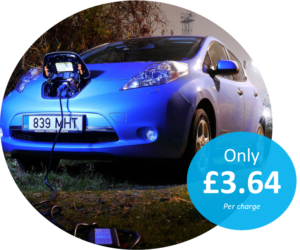Cost of charging an electric car
Cost of EV charging
A buyers guide to electric car charging
How to charge my electric car?
There are already over 100,000 electric cars on UK roads. This means that access to charging points is widely available, whether it be at home, at work or via a public charging station. Some of these charging points are free to use but most will involve some sort of charge.
The most popular choice among motorists continues to be a home charging point. Costing roughly £300 – £400 to install, home charging provides excellent cost savings for regular commuters. They can also make charging a lot more convenient and easier to access.
The next best option is workplace charging which is often used to incentivise employees. Public charging stations are also available at some supermarkets and service stations.

Things to consider…
-
Your annual mileage: A driver with annual mileage of around 10,000 miles/year could accumulate £800 in yearly savings.
-
Access to a charge point: Ideally you need a space close by to charge or preferably off-street parking.
-
Type of charge point required: Choose from varying outputs to suit the needs of your electric vehicle.
-
Overall budget: Typically a home charge point costs £1000 to install but could cost as little as £149 plus VAT.
-
Estimated CO emissions: Official carbon emissions should be less than or equal to 100g/km to avoid Vehicle Excise Duty (car tax)
Cost of home charging
Choosing to charge your car at home is the most popular choice for most electric car chargers. It’s not only more convenient, it also works out to be the cheaper option for most of us with multiple ways to tailor your consumption.
For example, the Nissan Leaf is able to cover around 110 miles off a single charge which averages out at just £3.64. Costs are kept this low due to competition within the electrical industry which helps to make the average electrical rate only 13p per kWh. The cost of servicing your electrical vehicle remains low as well at an average of £99/year. This is partly due to evolving technology and the fact that their is no oil to change.

Benefits of workplace charging
Did you know that over 30% of all EV Charging is done at work? Some employers may even offer electric car charging to employees for free. Others will choose to set a paid tariff or incentivise staff by making it free for a given period.
This encourages staff to reduce their carbon emissions and helps to demonstrate the businesses environmental credentials. These charging stations are also very inexpensive to operate and require very little maintenance.
Employees also benefit from tax exemptions in most cases.
Real life example
Based on a standard Type 2 Double Headed 7 kW charging station, you would be looking at a cost of around £2,200 with the option of WCS grant funding. This would reduce the cost by up to £600. Some businesses may require up to 22 kW output which vary in price and would require a survey to assess your exact requirements.
